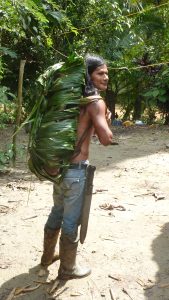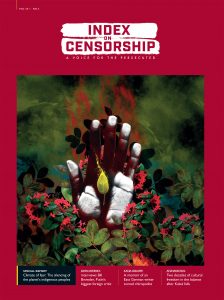27 Oct 2021 | News and features, The climate crisis, Turkey, Volume 50.03 Autumn 2021, Volume 50.03 Autumn 2021 Extras
“Funded by George Soros and the Rockefeller family, Greenpeace organises chaotic events around the world, spearheading protest movements against the construction of the Istanbul Canal,” Yeni Akit, the Turkish government’s favourite far-right newspaper, reported recently.
The artificial sea-level waterway, if it gets built, will connect Marmara with the Black Sea, with an outcome most experts agree will be catastrophic for Istanbul and the Marmara Sea. But Turkey’s Islamist government brands anyone opposing its ecocidal project as traitors and foreign agents.
“Greenpeace issued a statement, ‘No to the Istanbul Canal’, on its website, insistently disseminating the lie that this project will harm the environment,” the pro-government daily warned, calling the canal “the project of the century” and describing criticisms and warnings from activists, experts and scientists as “mere propaganda”.
Attacks on environmental activists have never been greater in Turkey, where laws passed under the state of emergency in 2016 continue to allow Islamists to detain dissidents and NGO workers as “terrorist sympathisers”.
For Özgür Gürbüz, one of Turkey’s most seasoned environmental activists, the atmosphere of 2021 is reminiscent of the early 2000s.
Since the 1990s, Gürbüz has organised petitions against the construction of nuclear plants in Turkey; marched outside embassies to protest against nuclear projects by Chinese, French, Japanese and Russian companies; and once walked, backwards, from Mersin to Akkuyu – a 170km journey – to make his voice heard.
One of Turkey’s first environmental reporters, Gürbüz worked for the liberal Yeni Yüzyıl newspaper in 1996 when he began covering protests against Turkey’s first gold mine in the Anatolian town of Bergama. The Canadian company that operated the mine used cyanide in the extraction process. Villagers who opposed the technique placed ballot boxes in Bergama’s town square and held a vote, using direct democracy to settle the issue. They also travelled to Istanbul and, wearing Asterix and Obelix costumes, walked on the city’s Bosphorus Bridge carrying banners that read: “Hey police, first listen to what we have to say, then you can beat us!”
Gürbüz frequently travelled from Istanbul to Bergama to cover the protests. “Then one day,” he recalled, “a massive conspiracy theory, designed to demonise Bergama’s villagers, emerged.”
A German plot
According to the ultra-nationalist press, tales about cyanide were but a plot devised by a network of German NGOs, spearheaded by the Heinrich Böll Foundation, to bring Turkey to its knees. Ankara’s State Security Court opened a case in 2002, where 15 NGO workers faced spying charges which carried prison sentences of up to 15 years.
Meanwhile, a Turkish mining company called Koza had taken control of Bergama’s mine. Gürbüz smelt a rat. Whenever he called Koza, the company’s press officer asked him: “Do you know what German NGOs had been doing here? Let me send you a cache of information!” But a brief glimpse at the documents showed they contained nothing “but unfounded claims”.
Gürbüz believes Koza had disseminated disinformation to dissuade patriotic Turks who supported the uprising from opposing their takeover. It later transpired that Koza was one of the companies operated by the movement of Fetullah Gülen, the Islamist preacher who allied with president Recep Tayyip Erdoğan in the 2000s to purge secularists from Turkey’s public sector.
This tactic of criminalising civil society cast a long shadow that continues to this day.
“Sometimes they accuse us of being German spies; other times we’re British collaborators. Countries change; the accusation of being in the pay of foreign powers does not,” Gürbüz said. “But their accusations devastated Bergama villagers. I know them. They love their soil, and all they wanted was to practice agriculture.
“They are patriots, typical Anatolian people who suddenly found themselves on the telly, portrayed as German and British agents. It was impossible for them not to panic.”
For scholars and experts who worked for environmental causes, the prospect of a knock on the door from the security services became a real possibility. “The public broadcaster TRT gave airtime to the disinformation campaign featuring German NGOs. Such speculation exhausted and harmed Turkey’s burgeoning environmental movement,” said Gürbüz.
The spying case that began in 2002 came to nothing. Still, its mentality set the tone for the oppression of green activists over the next two decades, casting doubts on international NGOs just as the climate crisis worsened.
“Those who environmentalists rattle use whatever tool that comes in handy for them,” Gürbüz said, pointing to Aysin and Ali Ulvi Büyüknohutçu, a couple in their 60s known for their environmental activism in south-west Turkey, who were murdered in 2017. Gürbüz said: “They were trying to defend their environment. They received no funding, and yet the forces opposed to their struggle hired a young man to shoot them with a hunting rifle.”
Gürbüz sees a pattern in these cases where polluters use Turkey’s xenophobic climate to blame NGOs that oppose their ecocidal projects.
“Other tactics include tax controls, sending inspectors to NGOs to intimidate their workers,” he said.
To counter such manoeuvres, Gürbüz believes, journalists must act boldly. “In the past, we used to deal directly with the government because most polluters were public bodies. With the new autocratic regime, things are different. Private company CEOs are friends of newspaper tycoons who have ties to the government. Thanks to these intricate ties, the field for environmental journalism has shrunk.”
Tuna censorship
Gürbüz has suffered numerous instances of censorship. After identifying heavy metals in fish samples from the Marmara Sea, his newspaper refused to print the word “tuna” to avoid angering advertisers. (He published the uncensored version on his blog.) When he travelled to Yatağan to report on the public health implications of a thermic plant, his editor refused to publish the report, fearing that the company behind the project might become the newspaper’s new owner.
“This is why independent media is so crucial for the environmental struggle,” Gürbüz said.
After his reporting career came to an end, he spent a year in China before, on returning to Turkey, entering the NGO world, working for Greenpeace Mediterranean’s energy campaign and moving to the Heinrich Böll Foundation to become project co-ordinator, overseeing which projects to fund. He also worked for WWF Turkey.
Then, in 2013, everything changed with Occupy Gezi, the biggest environmentalist protest in Turkey’s history.
“Thousands of people marched there, and they managed to save the park,” he said. “Honestly, it isn’t easy to see how such events begin and shapeshift. A handful of my friends who were collecting signatures outside Gezi suddenly saw their supporters snowball into thousands after bulldozers entered the park and cops burned their tents.”
As Gezi grew, Turkey’s Islamists once again branded environmental activists as foreign agents funded by “the interest lobby”, a dog-whistle term used to appeal to their antisemitic voters. Pro-government papers identified the German airline company Lufthansa’s jealousy of Istanbul’s planned new airport as the reason behind “the German hand” in protests.
But Gürbüz said: “If you want the agents behind Gezi, why don’t you look at the people who advised the government to build a shopping mall there in the first place? If it weren’t for them, these protests would never have happened.”
And yet their rabid discourse is still with us. Dozens of scientists, environmentalists and scholars have written extensively about the Istanbul Canal’s disastrous effects, and “it would be a strategic mistake for the government to try to present this as another foreign-funded opposition campaign”, Gürbüz said – but that is precisely what is happening. “This discourse is an insult to the mind of this nation.”
Turkey’s Green Party
In 2008, Gürbüz served as a co-founder of Yeşiller (Green Party), the second iteration of a party that originally launched in 1988. The original Yeşiller emerged as a fresh voice in the leftist circles that the 12 September coup in 1980 destroyed.
Koray Doğan Urbarlı, a green activist, has childhood memories of Yeşiller’s early protests. He said: “In 1990, when I was five, Yeşiller held a meeting in Izmir to oppose the construction of the Aliağa Thermal Power Plant. My parents also brought me to the Yatağan protests. I later learned that those were all Yeşiller events.”
In August 2008, Urbarlı attended a meeting organised by Yeşiller. The party was a month old, and it changed his life. Helping found its local Izmir branches, he devoted his life to Yeşiller.
There he also met Emine Özkan. Born in 1993, Özkan had spent her youth in an ultra-conservative family in Eskişehir, specialising in bird migration before starting work for NGOs. Today, Urbarlı and Özkan are spokespeople for Yeşiller’s third iteration.
“There was a straight line between bird preservation and politics,” Özkan said. “I discovered how LGBT rights, children’s rights and disability activism are all connected. Yet, as individuals, there is a limit to what we can achieve. The more we can organise this into a political struggle, the more we can deliver change.”
When she first entered the green struggle, just a few activists in Turkey were aware of the impending climate crisis. “Now, it impacts our lives daily. It adds to other problems: Turkey’s autocratic regime and economic crisis. What we have known and said in the background for years is now coming to the fore,” she said, adding that as authoritarianism increases and trust in the government diminishes, environmental NGOs and the women’s movement are on the rise.
“These days, oppressed people channel all their political frustrations via the green movement,” said Urbarlı, who accepts that talking critically about ecological issues is easier than in other fields in Turkey, such as those of minority or LGBT rights.
“In the past, we were seen as marginal figures; now what we say plays a crucial part in political debates.”
It’s little wonder Yeşiller is receiving the government’s cold shoulder. Despite submitting all the required documents on 21 September 2020, it has received no word from the Interior Ministry, which refuses to acknowledge it as a political party. “They neither deny nor affirm us. This violates our civil rights,” the co-founders said.
Turkey’s constitution clarifies that no one has the power to prevent a party’s foundation, and yet the government has “placed Yeşiller in limbo”.
Despite state muzzling, Yeşiller is hopeful for the future. “Looking at Occupy Gezi eight years on, we can see that the principles we held dear during the foundation of Yeşiller in 2008 were realised in the form of peaceful resistance, with demands for local democracy and gender equality,” Urbarlı said. “Gezi helped disseminate green ideas to bigger crowds, and it enlightens our ideas to this day.”
But the government’s xenophobic discourse has proved to be similarly resistant. When wildfires broke out in the country’s forests in late July, a social media campaign targeted Yeşiller after the party’s Twitter account pointed to climate change as the cause of the fires.
Pro-government newspapers said “Kurdish terrorists” were behind the fires; one journalist blamed the planting of “traitorous” pine trees as part of the Marshall Plan in the 1950s, calling it a sinister plan devised by “US imperialism” to burn Turkey to the ground with help from its “traitorous” local collaborators. The post was shared and liked by thousands.
“These conspiracy theories make people feel safe,” Özkan said. “This is the difficulty of environmental politics today. Despite these lynching attempts, we have to continue telling the truth.”
Urbarlı envisages a future in which the party can serve in a coalition government, anticipated to be formed after the general elections that are scheduled for 2023.
“It’s easy to be an environmentalist when you’re in the opposition,” he said, highlighting the example of Erdoğan, the Istanbul Canal’s architect, who used to conduct press conferences with Yeşiller to defend freedom of expression decades ago when he was the Istanbul head of the Islamist Welfare Party.
“Such is the difference between being in opposition and power, and it is a lesson we should learn from.”
19 Oct 2021 | Ecuador, The climate crisis, Volume 50.03 Autumn 2021, Volume 50.03 Autumn 2021 Extras
[vc_row][vc_column][vc_single_image image=”117715″ img_size=”full” add_caption=”yes” alignment=”center”][vc_column_text]Ecuador is not a safe country for environmental defenders. They are criminalised, threatened, attacked and even assassinated for attempting to uphold the rights of nature decreed in the constitution.
While the overt incitement to hatred against environmental activists ended when Lenin Moreno replaced Rafael Correa as president in 2017, and some imprisoned indigenous leaders were freed, the intimidation and threats continue.
In 2018, there were several attacks against members of the Collective of Amazonian Women who work to defend the Amazon region from oil and mining. Margoth Escobar had her house set on fire and Patricia Gualinga, from Sarayaku, had rocks thrown through her bedroom windows at night. Others received death threats.
The same year, three water defenders – including Yaku Pérez Guartambel, then president of indigenous peoples’ organisation Ecuarunari – were kidnapped by mine workers, believed to have been following orders from above. An angry mob kicked, dragged and tortured Pérez Guartambel, accusing him of leading anti-mining efforts. They planned on crucifying him and started gathering materials until a group of journalists broke through with cameras and rescued him.
Since a 2019 uprising of indigenous peoples in the country, the government has more forcefully set its sights on the indigenous movement as the internal enemy to be defeated.
Indigenous leaders are repeatedly persecuted and intimidated. The repressive apparatus has been strengthened, with millions of dollars allocated for the provision of equipment for the police and military. The creation of a new legal framework in May 2020 would have enabled the deployment of the military to control internal order. This would have provided protection to strategic sectors such as mining, against which indigenous communities have been struggling for years.
In May 2021, right-wing banker Guillermo Lasso assumed the presidency in Ecuador, ending more than a decade of left-wing rule. Index on Censorship spoke to Franco-Brazilian academic and indigenous rights activist Manuela Picq about what the change means for censorship. After marrying Yaku Pérez Guartambel in an indigenous ceremony, Picq was herself censored by the government of Rafael Correa, which forced her into a three-year exile.
“There are many ways of censoring. We have seen traditional censorship mostly from the left in Ecuador, by Correa in particular, who implemented very repressive media legislation and enforced it with violent oppression. Then there are other forms of censorship, which are not traditionally recognised as such, the neo-liberal way of buying support. Under Lasso, journalists and media outlets are not fulfilling their critical role because they receive so much state advertising revenue. I see this as a form of censorship, when the public is left uninformed about the government’s activities, which happen largely in the dark. In this context, whistle blowers will play a critical role,” said Picq.
“This is a weak government that has been forced to ally with Pachakutik, the political party of Ecuador’s indigenous movement, which is currently presiding over congress. This means Lasso will carry out his agenda in the most discreet way possible, to avoid being overthrown. So, mining in indigenous territories, or the privatisation of the public sector will be labelled as “development”. We are relieved in Ecuador that we no longer have Correa-ism, with its traditional, explicit forms of censorship, but we should not underestimate the other forms of censorship that are more subtle and insidious.”
The multicoloured people
Jimmy Piaguaje is a young indigenous Siekopai defender from Siekoya Remolino, a community of 53 families living on the banks of the Aguarico River in the north-eastern Ecuadorian Amazon region.
The Siekopai (which means multicoloured people) are renowned for their shamanic acumen and knowledge of medicinal plants, with uses for more than 1,000 different plants.

The Siekopai are known as the multicoloured people, photo: Erin Deo
In the 1600s, when Jesuit missionaries arrived in Siekopai territory, there were 30,000 to 40,000 Siekopai in the zone between Putumayo, the Aguarico River and Napo.
Traditionally, the Siekopai lived communally in gigantic malokas (open sided wooden huts) with 40 to 60 families. This coexistence meant that people did everything together. Everyone got up at about 3am to prepare and drink yoko, twist threads of chambira (a palm from which the fibre is removed to make hammocks) and tell stories. The women would discuss what they would do that day, what the future would bring. The children would be there, too, learning from their parents and elders.
The missionaries brought illnesses such as measles, wiping out 90% of the population. Whole peoples and clans disappeared. The few who survived did so by hiding in the depths of the jungle. Then the rubber-tappers arrived and removed the Siekopai from there, too.
Currently only around 1,600 Siekopai remain – 900 in Peru and 700 in Ecuador, where they live in a 50,000-acre fragment of rainforest.
“We feel very threatened, very worried, because our territory is very small and we are surrounded by oil exploitation and monoculture agriculture,” said Piaguaje.
“I know from talking with my father, with our elders, how our territory used to be. Now we have almost no resources, almost no fish, no animals to hunt. Our rivers are contaminated by toxic waste from the oil palm industry. Lack of food sovereignty is a really big worry. These are the threats that we are facing.
“All of these things have made us think about where we are going. Will our culture survive another five, 10, 20 years? Or will we just die?”
The pandemic, too, has had a deep impact on the Siekopai.
“In the Ecuadorian Amazon, the Siekopai nationality was the first to confirm positive cases of Covid-19,” said Piaguaje. “A wise elder who died of Covid – a family member of mine – knew a lot about medicinal plants. That was major blow for the Siekopai because there aren’t many of us and we all know each other. Then a teacher died; he had long been involved in the struggle to defend our culture. It was a very difficult situation.”
The Siekopai sought help from the local and national governments but there was little or no response, although some organisations provided medicine, tests and accurate information.
“We started to realise that the medicine from outside wasn’t helping us,” said Piaguaje. “Faced with many cases of Covid, we started to look to medicinal plants. In the end, the majority of people who survived were treated with medicinal plants. And we’re still treating people with plant infusions, such as ajo del monte, chinchona and cedros, with good results.
“This has led to some very important reflections within the Siekopai communities; a rediscovery, appreciation and faith in our own ancestral medicines. And when everything collapsed in the outside world, although we were affected, we were more or less OK. This has been a deep reflection for us, seeing how the rest of the world is suffering and realising what is important.”

Just 1,600 Siekopai survive in a 50,000-acre fragment of rainforest, photo: Erin Deo
In response to the existential threats they face, Piaguaje and a group of other young Siekopai leaders have formed an organisation, Sëra, named after the spirit of heaven that arrives every summer to announce a new era. They have developed a number of innovative projects, safeguarding ancestral shamanic knowledge in video format and running environmental workshops with Siekopai youth.
“Ancestral knowledge is being rapidly lost,” he said. “Young people are no longer interested, due to the influence of the Western world. Our wise elders are dying without leaving a legacy.
“Together with another young Siekopai defender, I created a project to safeguard their knowledge with videos. We go out with them when they are harvesting plants and record them talking about how they identify and use them. This project brought our group of young leaders together.”
The group is now running school workshops to promote environmental awareness through intergenerational exchange between elders, parents and children.
“We talk about ancestral knowledge, the identification and uses of medicinal plants, the threats that we face. We ask, what is important to us, what do we want to preserve, as Siekopai? The aim is to instil in the children the consciousness that our territory matters, that they should have respect for the elders, for Mother Nature, for our own cosmovision [the worldviews shared by indigenous peoples].
“We know that the children are like seeds; if we plant in them the idea that they must cut down the jungle to plant oil palm, they will want to do that,” he said.
“But instead we are saying to them, ‘We must take care of the jungle, this is our wealth, there are other ways to do things, to survive’. That’s why I think education is so important.”
Piaguaje believes it can help combat climate change.
“The indigenous worldview is based on living in harmony with nature and other people, respecting everything around us,” he said.
“It is a model that does not require us to plunder all natural resources. We are taught that we are all part of Mother Nature, that it is our responsibility to use resources in a sustainable way.
“Mother Nature provides everything: medicine, food, water and air. We don’t need to destroy but to co-exist.
“This way of life is based on reciprocity. Even if the other person is different from me, we share. Sharing and co-operation. That is how our ancestors lived and that should be the model of how we live, too.
“I think a global shift towards these values could help to combat climate change.”
The People of Noon
José Gualinga is a leader of the Native People of Sarayaku, an indigenous Kichwa group with 1,400 inhabitants living in a remote part of Ecuador’s southern Amazon.
Known for their defence of the rights of nature and indigenous peoples, the Sarayaku call themselves the People of Noon, referring to an ancient prophecy of their ancestors claiming that they would be a pillar of resistance after other communities had surrendered – a beacon of light as strong as the midday sun.
In 2012, the Sarayaku won a historic victory at the Inter-American Court of Human Rights, which found that the Ecuadorian state had violated their rights by allowing an oil company to prospect in their territory without consultation.

Photo: Beth Pitts
A turning point in the case came when José’s father, Don Sabino Gualinga, the spiritual leader of Sarayaku and their most eminent yachak (shaman), then aged 92, took the witness stand. He was asked about the impact of the 1,433kg of explosives that had been planted in Sarayaku territory by the oil company, accompanied by armed military personnel. Referring to the invisible beings that had been disturbed by the explosions, Don Sabino said that “half of the masters of the jungle are no longer there”.
He added: “It is a living forest. There are trees and medicinal plants and all kinds of beings … Many hid, others died when it burst. They are the ones who maintain the jungle, the forest … All of those who wish to cause damage, they don’t understand what they are doing. We do understand it, because we see it.”
The same year, the Sarayaku created the Kawsak Sacha (Living Forest) Declaration asserting that, as a living entity, their territory is subject to legal rights and demanding that these rights be upheld. The proposal was presented at global climate change conference COP21 in Paris and to French president François Hollande in 2015, and to the Ecuadorian government in 2018 before winning the prestigious UN Equator Prize in 2021.
The Sarayaku have also launched a professional football team to spread the word about oil exploitation in the Amazon; sailed a canoe down the Seine; and created a documentary, Children of the Jaguar, which won best documentary at the National Geographic Film Festival in 2012. Their 2021 documentary, The Return, which tells the story of one family’s retreat into the Amazon to escape Covid, was made for The Guardian and featured at the 2021 Sheffield DocFest.
In 2021, the Sarayaku are once again under threat, with the government’s plan to auction three million hectares of largely virgin rainforest to oil companies, including nearly all the Sarayaku territory. To represent their peaceful resistance to extractivism and commitment to defend the Kawsak Sacha, the Sarayaku are planting a 100km-long perimeter of flowering trees around their territory known as the Sisa Ñampi; it symbolises the fragility of life and the ephemeral limit of existence between life and death.
Gualinga believes that the philosophical thought of the Sarayaku can help combat climate change.
“Climate change will be resolved only if we actively seek solutions,” he said. “Global citizens must undertake a long road to resistance and peaceful struggle, towards a different perspective that we call tiam. By itself this philosophical thought is only a form of knowledge, but it can be made reality if each and every one of us participates in the minga [collective community work].
“Tiam is a counterpoint to the dominant worldview, which sees nature as ‘other’, as an object for exploitation. This has led to imbalance and severe climatic changes, as well as the current pandemic. At the heart of our philosophy lies the understanding that we live as an embryo in the womb of the Pachamama [Mother Earth]. Only in this way will nature be respected, will we live harmoniously, benefiting from the resources that the Pachamama bestows on us.
“We believe that if the human being accepts this way of life, the pain of the planetary wound will be felt, healed, and life will be born again.”
He added: “Indigenous peoples are already contributing towards global climate change solutions by taking care of their territories, which are mega-diversities of living beings. The Sarayaku conceived the Kawsak Sacha life project as a powerful nucleus, so that through these invisible beings, who are conscious and therefore have legal rights, we can regulate the balance of the earth and together we can fight climate change.”
Many communities of indigenous peoples have been divided by oil companies but the Sarayaku have maintained unity, said Gualinga.
“The unity of the Sarayaku arises from the legacy of our ancestors, from the great stories and prophecies that have led us to consider ourselves as the People of Noon, descendants of the jaguar, children of Amazanga Runa,” he said.
“Other nationalities – let us call them ‘communities’ or ‘peoples’ – their unity is maintained in a superficial way, through an organisation. While the statute of the organisation may be recognised by the competent authorities, the people lack the background of using their history and wisdom as a strength.
“When the unity of a society – or let’s call it a ‘cultural civilisation’ – of the Amazon forest is founded on historical and cultural principle, the oil companies cannot break it.”
The people of Sarayaku are masters in the selective use of modern technology, such as digital resource mapping, and using social networks without losing their cultural identity.
“If well used, technology can serve to strengthen new processes of collective and organised adaptation,” said Gualinga. “Based on this logic and analysis, the people of Sarayaku have adopted certain tools, such as the internet, which we use to disseminate the processes resistance in defence of our lives; to make known the proposals that come from within the territory and from the deep jungle. The jungle society has always been in a state of interaction, actively looking for solutions for threats such as climate change.
“Historically, it was impossible to make visible Sarayaku’s proposals in a dominant, complex world, full of wars and devastating economic conflicts. Now, with these new technologies, we can successfully disseminate communications on history, culture, proposals, visionary projects to conserve and protect the balance of the land and ensure the continuity of the Living Forest.
“These technologies have also allowed us to safeguard the memories of art, culture and stories, so that future generations can continue learning.”
Help the Siekopai Indigenous Amazonian Youth Foundation through its crowdfunding campaign at gofundme.com/f/siekopai-indigenous-amazonian-youth-foundation.
This article is based on interviews for Writers Rebel[/vc_column_text][/vc_column][/vc_row]
30 Sep 2021 | Events
[vc_row][vc_column width=”1/2″][vc_single_image image=”117589″ img_size=”full”][/vc_column][vc_column width=”1/2″][vc_column_text]In preparation for COP26, Index on Censorship invites you to reflect on the role of indigenous activists in climate activism.
As we prepare for challenging and necessary conversations at COP26, Index on Censorship brings attention to the cases of people whose voices are too easily forgotten in climate change debates. Index sheds light on the challenges of speaking up about climate change.
Join us for the launch of the new Index on Censorship magazine, A Climate of Fear. The conversation will be chaired by Index on Censorship acting editor Martin Bright with a focus on indigenous activists in Ecuador fighting for environmental justice and those who tell their stories.
Steven Donziger is a US lawyer who was part of an international legal team that obtained a multi-billion-dollar pollution judgment designed to remedy decades of deliberate toxic dumping by global oil company Chevron on indigenous ancestral lands in Ecuador.
Jimmy Piaguaje is an indigenous defender and filmmaker of Siekopai nationality from the community of Siekoya Remolino in Ecuador’s northeastern Amazon region. He is the co-founder of the Sëra Foundation, a grassroots organisation created by a group of young people from Siekoya Remolino to preserve their ancestral knowledge via audiovisual techniques and education. His latest documentary, about fighting covid in the Amazon with ancestral medicine, was published by the New Yorker.
Bethany Pitts is a writer and activist who has been working with indigenous communities in Ecuador since 2013, especially those defending the Amazon from oil exploitation. She is the author of the Moon Guide to Ecuador & The Galapagos Islands, the first internationally published guidebook on Ecuador with a focus on ethical travel. It was while Bethany was in the Amazon researching for her book in 2018 that she met Jimmy Piaguaje. Since then, she has been working to support the Sëra Foundation.
Martin Bright has over 30 years of experience as a journalist, working for the Observer, the Guardian and the New Statesman among others. He has worked on several high-profile freedom of expression cases often involving government secrecy. He broke the story of Iraq War whistleblower Katharine Gun, which was made into the movie Official Secrets (2019) starring Keira Knightley. He is the founder of Creative Society, a youth employment charity set up in response to the economic crash of 2008.[/vc_column_text][/vc_column][/vc_row][vc_row][vc_column][vc_column_text]
When: Tuesday 19 October 2021, 17:30 to 18:30 BST
Where: ONLINE
[/vc_column_text][/vc_column][/vc_row]
29 Sep 2021 | Afghanistan, Americas, Artistic Freedom Commentary and Reports, Asia and Pacific, Australia, Burma, Cuba, Ecuador, Europe and Central Asia, Israel, Lukashenko letters, Magazine, Magazine Contents, Middle East and North Africa, Religion and Culture, Russia, Syria, Turkey, Uganda, United Kingdom, United States, Volume 50.03 Autumn 2021, Volume 50.03 Autumn 2021 Extras

The Autumn issue of Index magazine focuses on the struggle for environmental justice by indigenous campaigners. Anticipating the United Nations Climate Change Conference (COP26), in Glasgow, in November, we’ve chosen to give voice to people who are constantly ignored in these discussions.
Writer Emily Brown talks to Yvonne Weldon, the first aboriginal mayoral candidate for Sydney, who is determined to fight for a green economy. Kaya Genç investigates the conspiracy theories and threats concerning green campaigners in Turkey, while Issa Sikiti da Silva reveals the openly hostile conditions that environmental activists have been through in Uganda.
Going to South America, Beth Pitts interviews two indigenous activists in Ecuador on declining populations and which methods they’ve been adopting to save their culture against the global giants extracting their resources.
 Cover of Index on Censorship Autumn 2021 (50-3)[/caption]
Cover of Index on Censorship Autumn 2021 (50-3)[/caption]
A climate of fear, by Martin Bright: Climate change is an era-defining issue. We must be able to speak out about it.
The Index: Free expression around the world today: the inspiring voices, the people who have been imprisoned and the trends, legislation and technology which are causing concern.
Pile-ons and censorship, by Maya Forstater: Maya Forstater was at the heart of an employment tribunal with significant ramifications. Read her response the Index’s last issue which discussed her case.
The West is frightened of confronting the bully, by John Sweeney: Meet Bill Browder. The political activist and financier most hated by Putin and the Kremlin.
An impossible choice, by Ruchi Kumar: The rapid advance of Taliban forces in Afghanistan has left little to no hope for journalists.
Words under fire, by Rachael Jolley: When oppressive regimes target free speech, libraries are usually top of their lists.
Letters from Lukashenka’s prisoners, by Maria Kalesnikava, Volha Takarchuk, Aliaksandr Vasilevich and Maxim Znak: Standing up to Europe’s last dictator lands you in jail. Read the heartbreaking testimony of the detained activists.
Bad blood, by Kelly Duda: How did an Arkansas blood scandal have reverberations around the world?
Welcome to hell, by Benjamin Lynch: Yangon’s Insein prison is where Myanmar’s dissidents are locked up. One photojournalist tells us of his time there.
Cartoon, by Ben Jennings: Are balanced debates really balanced? Ask Satan.[/vc_column_text][/vc_column][/vc_row][vc_row][vc_column][vc_custom_heading text=”Special Report” font_container=”tag:h2|font_size:22|text_align:left”][/vc_column][/vc_row][vc_row][vc_column][vc_column_text]

Credit: Xinhua/Alamy Live News
It’s not easy being green, by Kaya Genç: The Turkish government is fighting environmental protests with conspiracy theories.
It’s in our nature to fight, by Beth Pitts: The indigenous people of Ecuador are fighting for their future.
Respect for tradition, by Emily Brown: Australia has a history of “selective listening” when it comes to First Nations voices. But Aboriginal campaigners stand ready to share traditional knowledge.
The write way to fight, by Liz Jensen: Extinction Rebellion’s literary wing show that words remain our primary tool for protests.
Change in the pipeline? By Bridget Byrne: Indigenous American’s water is at risk. People are responding.
The rape of Uganda, by Issa Sikiti da Silva: Uganda’s natural resources continue to be plundered.Cigar smoke and mirrors, by James Bloodworth: Cuba’s propaganda must not blight our perception of it.
Denialism is not protected speech, by Oz Katerji: Should challenging facts be protected speech?
Permissible weapons, by Peter Hitchens: Peter Hitchens responds to Nerma Jelacic on her claims for disinformation in Syria.
No winners in Israel’s Ice Cream War, by Jo-Ann Mort: Is the boycott against Israel achieving anything?
Better out than in? By Mark Glanville: Can the ancient Euripides play The Bacchae explain hooliganism on the terraces?
Russia’s Greatest Export: Hostility to the free press, by Mikhail Khordokovsky: A billionaire exile tells us how Russia leads the way in the tactics employed to silence journalists.
Remembering Peter R de Vries, by Frederike Geeerdink: Read about the Dutch journalist gunned down for doing his job.
A right royal minefield, by John Lloyd: Whenever one of the Royal Family are interviewed, it seems to cause more problems.
A bulletin of frustration, by Ruth Smeeth: Climate change affects us all and we must fight for the voices being silenced by it. Credit: Gregory Maassen/Alamy[/caption]
Credit: Gregory Maassen/Alamy[/caption]
The man who blew up America, by David Grundy: Poet, playwright, activist and critic Amiri Baraka remains a controversial figure seven years after his death.
Suffering in silence, by Benjamin Lynch and Dr Parwana Fayyaz The award-winning poetry that reminds us of the values of free thought and how crucial it is for Afghan women.
Heart and Sole, by Mark Frary and Katja Oskamp: A fascinating extract gives us an insight into the bland lives of some of those who did not welcome the fall of the Berlin Wall.
Secret Agenda, by Martin Bright: Reforms to the UK’s Official Secret Act could create a chilling effect for journalists reporting on information in the public interest.





 Cover of Index on Censorship Autumn 2021 (50-3)[/caption]
Cover of Index on Censorship Autumn 2021 (50-3)[/caption]
 Credit: Gregory Maassen/Alamy[/caption]
Credit: Gregory Maassen/Alamy[/caption]